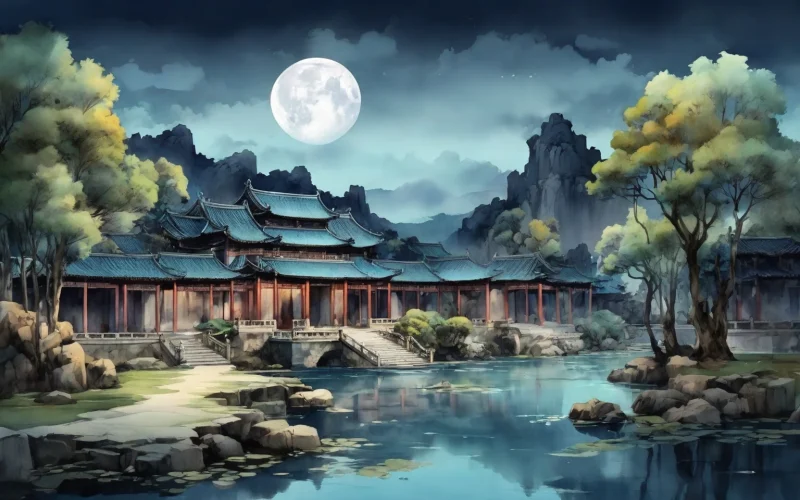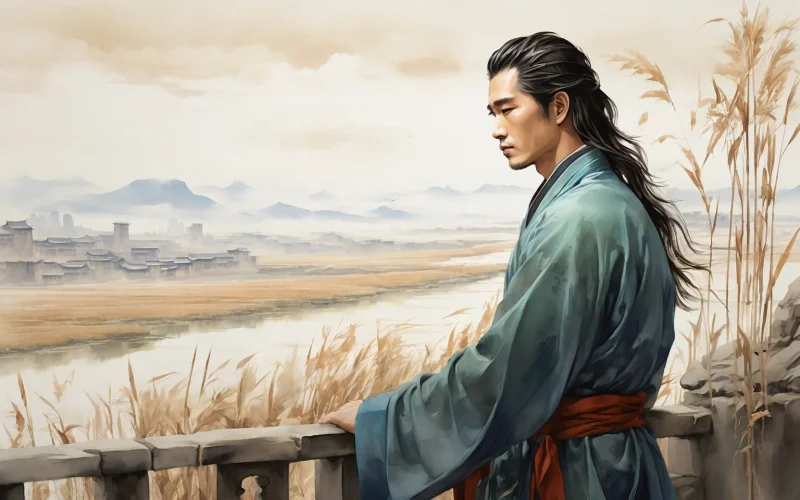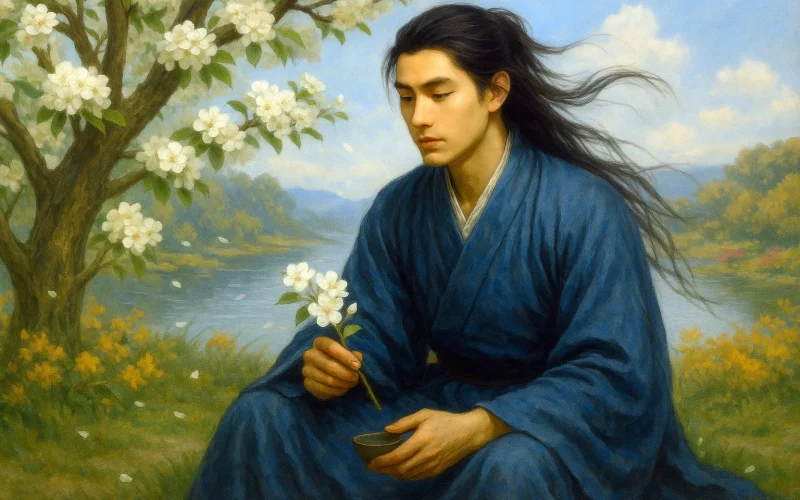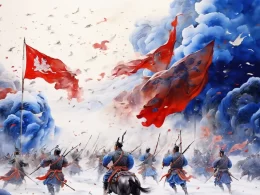The phoenix roofs lie shattered, the king’s pomp no more—
O Tiger Hill! Your moon chills tiles on the floor.
Zhaoyang’s golden songs are hushed, their music fled,
Yet the same autumn wind still sighs for glory dead.
Original Poem
「馆娃宫怀古五绝 · 其二」
皮日休
鸳瓦飞来翠辇空,武丘寒月冷宫栊。
昭阳殿里歌钟绝,惟有秋风似旧风。
Interpretation
This second quatrain in Pi Rixiu's series continues to explore the legendary tale of King Fuchai of Wu and his concubine Xishi. Through vivid contrasts between past splendor and present desolation, the poem paints a poignant picture of historical rise and fall, while employing subtle satire within its historical narrative.
First Couplet: "鸳瓦飞来翠辇空,武丘寒月冷宫栊。"
Yuān wǎ fēi lái cuì niǎn kōng, wǔ qiū hán yuè lěng gōng lóng.
Phoenix tiles still soar where jade carriages rolled no more; Cold moonlight chills empty halls by Tiger Hill's shore.
The poet uses "phoenix tiles" (鸳瓦) to symbolize the enduring remnants of past grandeur, while "jade carriages rolled no more" (翠辇空) underscores the vanished glory of royalty. The "cold moonlight" (寒月) and "empty halls" (冷宫栊) further enhance the atmosphere of abandonment and desolation.
Second Couplet: "昭阳殿里歌钟绝,惟有秋风似旧风。"
Zhāo yáng diàn lǐ gē zhōng jué, wéi yǒu qiū fēng sì jiù fēng.
In Zhaoyang Palace, music and chimes have ceased to sound; Only autumn's wind still whispers as it did when kings were crowned.
"Music and chimes have ceased" (歌钟绝) signifies the end of courtly revelry, marking the rupture of prosperity. The "autumn wind" (秋风) remains unchanged, echoing the past ("as it did when kings were crowned"), creating a stark contrast between immutable nature and the transience of human affairs. This juxtaposition heightens the sense of historical inevitability and the relentless passage of time.
Holistic Appreciation
Centered on the theme of "palaces enduring while human affairs vanish utterly," the poem interweaves present reality with historical illusion, expressing the poet’s profound lament for the dissolution of past glory. From "paired tiles that once took flight" to "silenced chimes of song," from "the cold moon over deserted halls" to "autumn winds unchanged," each step amplifies the weight of historical transience. The poet contrasts present desolation with bygone splendor, intensifying the melancholic tone, while using antiquity as a mirror to admonish the present age.
Artistic Merits
This poem adheres to the disciplined and concise five-line quatrain form, employing elegant diction and historical imagery to create a rich atmosphere of historical contemplation. The poet skillfully employs symbolism: "paired tiles" and "jade-adorned carriage" evoke imperial opulence, while "Zhaoyang Palace" and "autumn wind" represent the cyclical rise and fall of dynasties. Scene and emotion merge seamlessly, blending the tangible and intangible to construct an ethereal yet poignant historical tableau.
Insights
The poem’s depiction—from emperors reveling in opulence to palaces now hollow and silent—underscores history’s inexorable law of zenith and decline. Those who once wielded power and indulged in extravagance ultimately yield to time’s relentless tide. The poet thus admonishes posterity: fame and riches are but fleeting clouds; only through sober self-discipline and timely discernment can one avoid being blinded by grandeur or doomed by hubris. Palaces may stand, and winds may blow as ever, yet the people within are long forgotten by history.
About the Poet
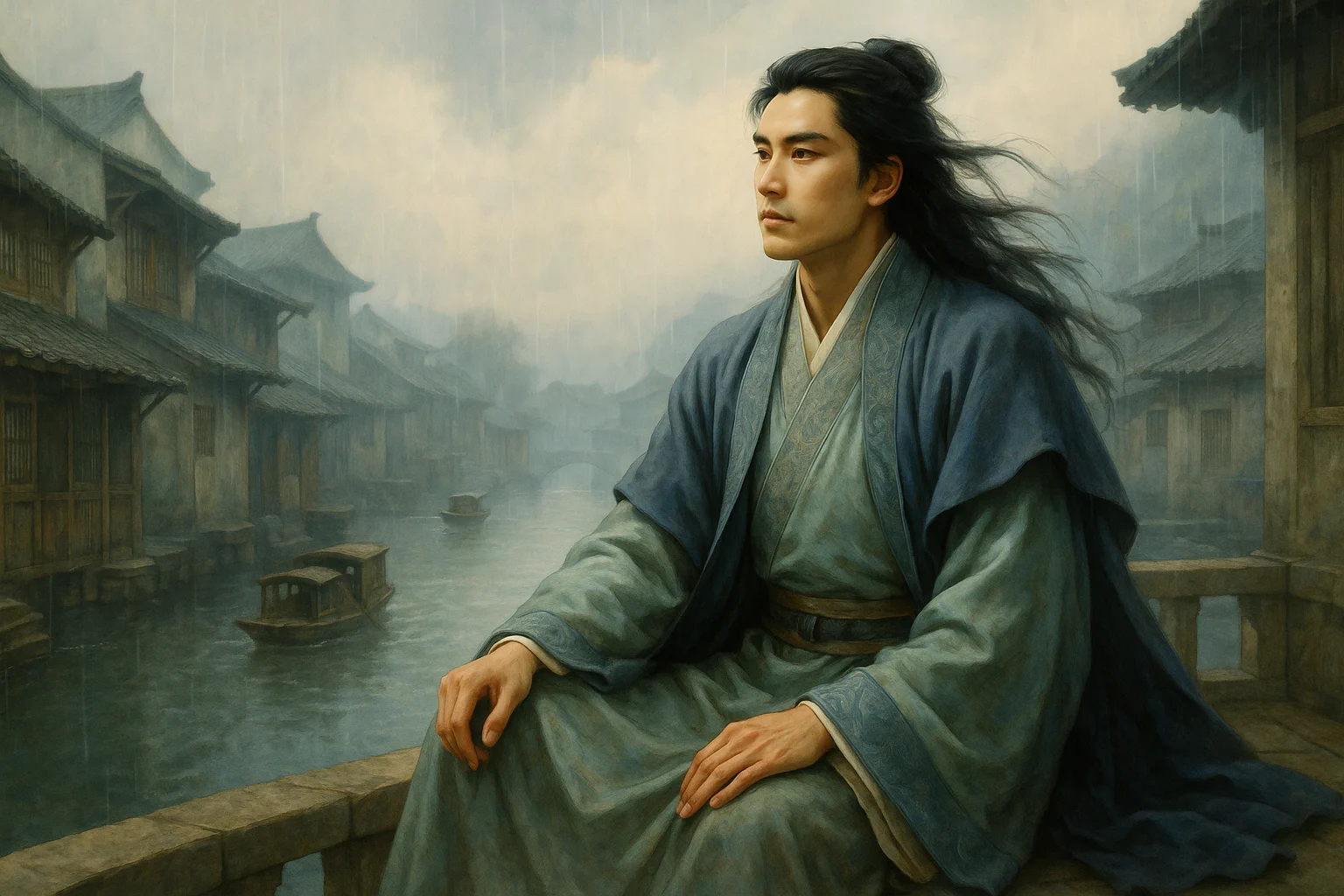
Pi Rixiu (皮日休, c. 834-883), a Late Tang dynasty poet and scholar from Xiangyang, Hubei. He obtained the jinshi degree in 867 (8th year of Xiantong era). His poetry carried on Bai Juyi's New Yuefu tradition. After the failed uprising, he was presumably executed, with most of his works lost. The Complete Tang Poems preserves over 300 of his poems.





